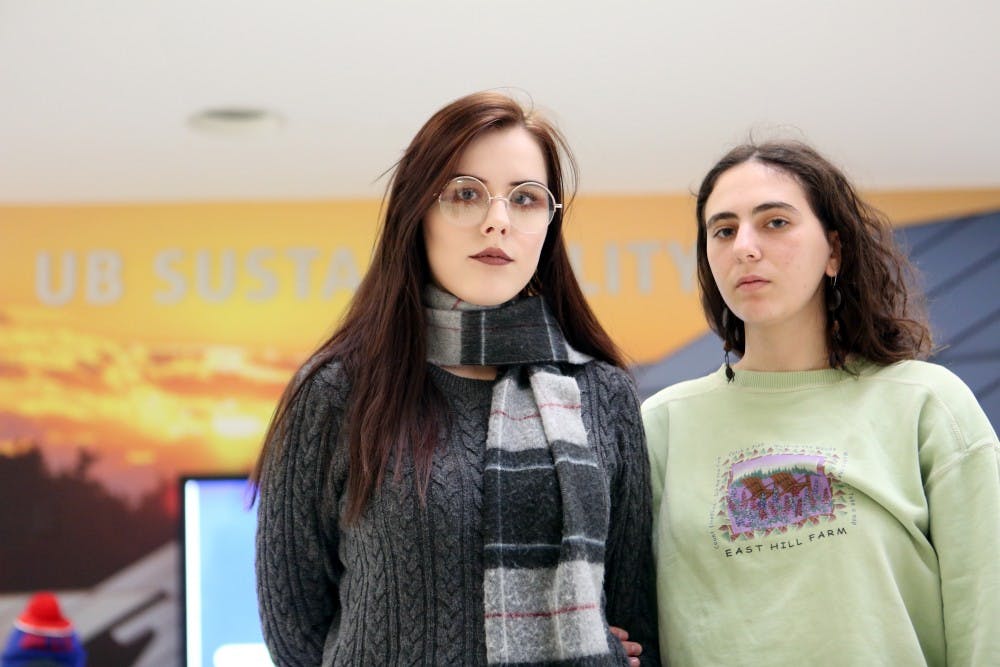The UB Foundation invested in an offshore firm that funds North American hydraulic fracturing –– more commonly known as fracking, a practice banned in New York State due to environmental concerns.
The investments were revealed on Nov. 17 through leaked documents called the Paradise Papers. The documents showed dozens of organizations nationwide have invested large sums of money in offshore entities. Students are frustrated and disappointed in the university’s investment and feel it is at odds with the university’s claims of sustainability.
Fossil Free UB, a student-led organization, has been calling for UB to divest from fossil fuel industries since the group formed in 2015. The Faculty Senate passed a resolution in May that called for UBF to divest from fossil fuels.
UBF is a tax-exempt nonprofit that handles donations to UB and manages the university’s endowment. The foundation has more than $1 billion in assets.
The foundation’s website says the organization is committed to “operating in a manner consistent with the policies of the University at Buffalo and the SUNY Trustees.”
But unlike the university, the foundation is a private entity and is not subject to open government laws, so it does not have to reveal where it invests its assets.
The Spectrum reached out to UBF Director Ed Schneider, who declined to comment.
In a meeting with UB Council Student Representative Mike Brown on Nov. 8, Schneider said the foundation doesn’t have any “direct investments” in fossil fuels, according to Brown. When asked why the foundation would not release a statement saying they don’t have any current or future direct investments in fossil fuels, Schneider said he felt it would be an “empty statement.”
“Apparently, the real reason they didn't want to say that they don't have any direct investments was because that's not entirely true,” Brown said.
Fracking is a process that extracts gas and oil from shale rock. It requires a large amount of water, which raises environmental concerns among critics. Opponents are also concerned that potentially carcinogenic chemicals may leak into the groundwater around fracking sites.
This is not the first time UB has come under fire for connections to the fossil fuel industry. In 2014, the university was criticized for its Shale Resources and Society Institute, an initiative researching fracking that was funded by a natural gas industry group. Critics felt the research was heavily biased in favor of the oil industry. President Tripathi said in a 2014 letter to the university community that the institute was closing due to a lack of “sufficient” faculty presence and inconsistency in disclosing its financial interests.
Following a seven-year study by the Department of Environmental Conservation, New York State banned fracking in 2015.
“High-volume hydraulic fracturing poses significant adverse impacts to land, air, water, natural resources and potential significant public health impacts that cannot be adequately mitigated,” DEC Director Joe Martens said in a June 2015 statement. “This decision is consistent with DEC’s mission to conserve, improve and protect our state’s natural resources, and to enhance the health, safety and welfare of the people of the state.”
Sophia Rogillio, a Fossil Free UB member and sophomore environmental design major, feels the UB Foundation should be aligned with the state’s position on “important issues” such as the environment because the state helps fund the university.
“New York State has made it clear fracking is not healthy for the land or the people, and most importantly, our future,” Rogillio said. “These investments clearly show the lack of concern the UB Foundation has when it comes to sustainability.”
Maddie Fives, a junior political science and environmental studies major and Fossil Free UB member, said she is disappointed with the foundation’s decision to invest in climate change and criticized the “sneaky tactics” of investing in an offshore account.
She understands that the foundation needs to make money, but in addition to being against her values, investing in fossil fuels is a poor business strategy, she believes, because the industry won’t exist long-term.
“There will come a time when there’s no more fossil fuels to extract,” Fives said. “[The foundation] should be investing in solar energy, wind energy — literally anything but fossil fuels. It amazes me that the school is investing in something so irresponsible.”
Junior political science major Erika Hollis thinks it’s “shady” that the foundation invests in fracking while the university promotes sustainability efforts.
“As a [research] university that seeks to lead the way in developing new energy technology, it is counterintuitive for them to basically be investing directly in fossil fuels,” Hollis said. “I believe the university should take steps to divest to make sure that it is not being influenced by large fossil fuel companies with a lot of pull.”
Alexa Ringer, a freshman environmental studies and art major and Fossil Free UB member, said the leaked documents “reaffirmed” her concerns about how the foundation handles its finances.
“It showed that they are working under the table to invest against our futures, in a dying and polluting industry,” Ringer said.
She feels if the university is going to claim to be sustainable, sustainability must be incorporated into “every aspect” of the university, including its foundation.
Maddy Fowler is the editorial editor and can be reached at maddy.fowler@ubspectrum.com





